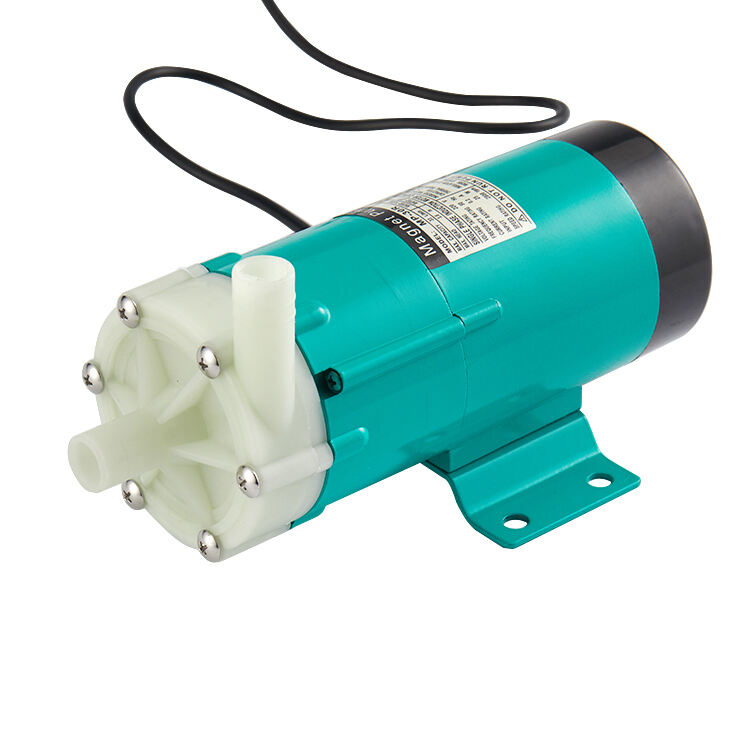Revolutionary Technology Transforming Chemical Processing Operations
The chemical processing industry has witnessed remarkable technological advancements over the past decades, with magnetic pump technology emerging as a game-changing innovation. These sophisticated pumping systems have revolutionized how industries handle corrosive, volatile, and hazardous materials, offering unprecedented levels of safety and efficiency. As facilities worldwide seek more reliable and sustainable solutions, magnetic pumps have become increasingly central to modern chemical processing operations.
The integration of magnetic pump systems represents a significant leap forward in fluid handling technology. By utilizing magnetic coupling to transfer power from the motor to the impeller, these pumps eliminate the need for mechanical seals, dramatically reducing the risk of leaks and contamination. This innovative design approach has caught the attention of industry leaders and process engineers who recognize the substantial benefits these systems bring to their operations.
Core Advantages of Magnetic Pump Technology
Enhanced Safety and Environmental Protection
Safety stands as the paramount concern in chemical processing, and magnetic pump systems deliver exceptional protection against leaks and spills. The sealless design eliminates the primary vulnerability point found in traditional pumps - the mechanical seal. This advancement significantly reduces the risk of chemical exposure to workers and prevents environmental contamination, making magnetic pumps an ideal choice for handling hazardous materials.
Environmental compliance becomes considerably easier with magnetic pump installations. The elimination of seal maintenance requirements and the virtual elimination of leakage possibilities help facilities meet and exceed regulatory standards. This proactive approach to environmental protection not only ensures compliance but also enhances corporate sustainability initiatives.
Reduced Maintenance Requirements
The simplified design of a magnetic pump translates directly into lower maintenance demands and reduced operational costs. Without mechanical seals to maintain or replace, facilities can significantly decrease their maintenance schedules and associated labor costs. The magnetic coupling system operates with minimal wear, extending the overall lifespan of the pump and reducing the frequency of parts replacement.
Maintenance teams particularly appreciate the reduced complexity of magnetic pump systems. The absence of seal maintenance requirements means less downtime for repairs and fewer specialized tools or skills needed for routine maintenance. This simplification leads to more efficient resource allocation and improved facility productivity.
Operational Excellence and Performance Benefits
Superior Chemical Compatibility
Magnetic pumps excel in handling a wide range of aggressive chemicals and corrosive substances. The absence of mechanical seals eliminates a common point of chemical attack, while advanced materials used in construction ensure exceptional resistance to corrosion. This versatility makes magnetic pump systems ideal for processing everything from strong acids to volatile organic compounds.
The chemical compatibility of magnetic pumps extends beyond basic resistance. These systems can be customized with various materials of construction, including exotic alloys and advanced polymers, to match specific chemical processing requirements. This adaptability ensures optimal performance regardless of the media being pumped.
Enhanced Process Efficiency
The magnetic pump design contributes significantly to improved process efficiency. The elimination of friction losses associated with mechanical seals results in better energy efficiency and more consistent flow rates. The magnetic coupling system allows for precise control of pump speed and output, enabling better process optimization.
Process engineers have noted that magnetic pumps maintain their efficiency levels over extended periods, unlike traditional pumps that may show degraded performance as seals wear. This sustained performance helps maintain product quality and reduces process variations, leading to more consistent output and better quality control.
Economic Implications and Return on Investment
Long-term Cost Benefits
While the initial investment in magnetic pump technology may be higher than traditional pumping systems, the long-term economic benefits are substantial. The reduction in maintenance requirements, decreased downtime, and lower replacement part needs contribute to significant cost savings over the life of the equipment. Many facilities report payback periods of less than two years when factoring in all operational benefits.
The elimination of seal maintenance costs alone can justify the investment in magnetic pump technology. When combined with improved energy efficiency and reduced waste handling requirements, the economic advantages become even more compelling. Forward-thinking companies recognize these benefits and increasingly incorporate magnetic pumps into their capital planning strategies.
Productivity and Uptime Improvements
The reliability of magnetic pump systems directly translates to improved facility uptime. With fewer maintenance interruptions and reduced risk of unexpected failures, processing operations can maintain more consistent production schedules. This increased reliability helps facilities meet production targets and maintain customer commitments more effectively.
The impact on productivity extends beyond simple uptime calculations. The reduced need for maintenance interventions means that technical staff can focus on other critical tasks, improving overall facility efficiency. The simplified maintenance requirements also reduce the need for specialized training, making workforce management more flexible.

Future Trends and Technological Developments
Smart Integration and Industry 4.0
The evolution of magnetic pump technology continues with the integration of smart monitoring systems and Industry 4.0 capabilities. Modern magnetic pumps can be equipped with sensors and monitoring systems that provide real-time performance data, enabling predictive maintenance and improved process control. This digital integration helps facilities optimize their operations and prevent potential issues before they impact production.
Advanced diagnostic capabilities are becoming standard features in newer magnetic pump systems. These innovations allow operators to monitor critical parameters such as temperature, pressure, and flow rates, ensuring optimal performance and early detection of potential problems. The integration with facility-wide control systems enables better coordination and optimization of entire processing lines.
Sustainability and Energy Efficiency
As industries focus increasingly on sustainability goals, magnetic pump technology continues to evolve to meet these demands. Newer designs incorporate energy-efficient motors and optimized magnetic coupling systems that further reduce power consumption. These improvements help facilities reduce their carbon footprint while maintaining or improving process efficiency.
Research and development efforts are ongoing to enhance the energy efficiency of magnetic pumps even further. Innovations in materials science and magnetic coupling design promise to deliver even more efficient and sustainable pumping solutions for the chemical processing industry.
Frequently Asked Questions
What makes magnetic pumps particularly suitable for chemical processing?
Magnetic pumps excel in chemical processing due to their sealless design, which eliminates the risk of leaks and contamination. Their superior chemical compatibility, reduced maintenance requirements, and ability to handle corrosive materials safely make them ideal for demanding chemical processing applications.
How do magnetic pumps compare to traditional sealed pumps in terms of maintenance?
Magnetic pumps require significantly less maintenance than traditional sealed pumps because they eliminate the need for mechanical seal maintenance and replacement. This results in reduced downtime, lower maintenance costs, and fewer spare parts inventory requirements.
What are the primary considerations when selecting a magnetic pump for chemical processing?
Key considerations include the chemical compatibility of construction materials, required flow rates and pressure requirements, temperature ranges of the process media, and the total cost of ownership including initial investment, maintenance, and operating costs. It's also important to consider the pump's integration capabilities with existing control systems and monitoring requirements.

